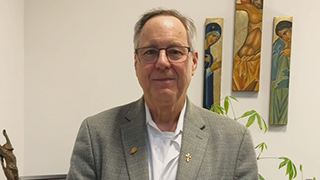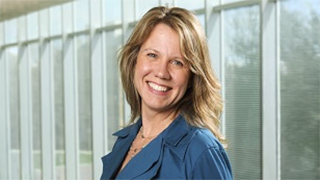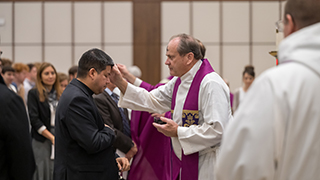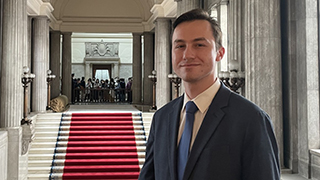Speech-language Pathologist Designing Better Strategies to Advance Writing Skills in Students of Diverse Abilities and Interests - Seton Hall University
Tuesday, March 21, 2023
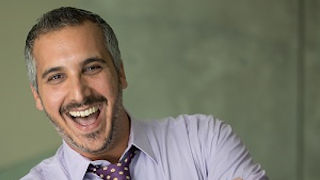
"I [have always been] motivated to find ways to improve language and literacy skills for kids of all abilities and individual needs," he says. "Most of my research centers on understanding why kids with learning disabilities struggle with developing writing skills within conventional school curricula."
Now, with full support from Seton Hall and $1.4 million in grant funding from the U.S. Department of Education, Koutsoftas is about to embark on a one-year research sabbatical to scale up Project WILLD (Writing in Students with Language-based Learning Disabilities), a multi-institutional initiative to develop curricula for 4th and 5th graders struggling with writing skills.
"First, we were focused on getting lesson plans together and collaborating with schools and students to gather input," says Koutsoftas, co-principal investigator of Project WILLD, which launched in 2020. "Now, we have a randomized controlled study going in four New Jersey school districts." The Project WILLD team is planning to expand their study and curricula to many more partner schools and ultimately hopes to make the program broadly available throughout the U.S.
During his upcoming sabbatical, Koutsoftas will also explore new ways of motivating school-age children to learn reading and writing based on their unique background knowledge and interests. "Not all kids learn the same way, or are motivated by the same things," he says. "If a student says they only want to read about frogs all day long, I think they should be able to do that. I want to look at more creative ways to inspire children to read and write, outside the standard reading levels approach that dictates what students should be reading based on their age or grade level."
In 2022, Koutsoftas and colleagues in the Seton Hall departments of speech-language pathology and occupational therapy successfully completed another effort funded by the U.S. Department of Education: Project Write to Learn. The project trained graduate students in evidence-based approaches to successfully help students with language-based learning disabilities improve their ability to communicate through writing.
Through his clinical, research and teaching experiences, Koutsoftas has observed that education in the U.S. is not currently designed to help students become independent and critical thinkers.
"Teaching at the college level, I see that most students are trained by K-12 schooling to find the ‘right’ answer," he says. "Schools aren’t giving students enough time to chill out, explore, and grow. Young children should be playing and learning how to be imaginative in group settings that encourage communication and expressive thought. If you develop a strong imagination in your younger years, you will be able to imagine creative solutions to problems later in life."
He says learning at all grade levels would ideally happen in a more collaborative setting, rather than only via one-way instruction from one teacher to 30 students working individually in a classroom. "In any industry or career, people are not working in isolation or taking rote direction from one person," he says.
He would also like to see speech-language specialists and occupational therapists do more work inside classrooms, rather than removing children with special education needs from the larger group setting. "Why not put all the professionals into the classroom to combine their skills and create a developmentally stimulating environment that suits a variety of learning types, without isolating some children from the larger group?"
These goals motivate Koutsoftas’s work, which has been published in numerous peer-reviewed journals, including Exceptionality: A Special Education Journal, Topics in Language Disorders, The Elementary School Journal and Journal of Speech, Language and Hearing Research.
Koutsoftas, the 2021 "Researcher of the Year" at Seton Hall’s School of Health and Medical Sciences, was recently named co-editor in chief for the peer-reviewed journal Seminars in Speech and Language, overseeing the peer-review process for pediatric research papers. The journal is dedicated to publishing research reports and expert perspectives that have clinical implications, he says, and has recently shifted to an open submission model meant to encourage authors to pitch more pioneering and unconventional viewpoints and papers.
"I’m learning a lot, and it’s very rewarding to help other researchers in my field express their unique ideas through writing," he says.
For people considering whether they would like to pursue a master’s degree in speech-language pathology, Koutsoftas says there’s a strong job market and demand for speech-language pathologists in the clinical realm, education sector, and academic research.
Seton Hall’s master of science in speech language pathology is a particularly "intense" program, Koutsoftas says. "It’s two years, five semesters, three clinical internships." Graduate students can also expect to benefit from on-campus clinical simulations, where medical actors play the role of patients with communication disorders. The majority of the program’s graduates have job offers lined up by the time their degree is completed.
"If you want to help people, and you’re interested in communication, think about speech pathology as a career," he says. "In this field, you’re often working with people who are coming to you because they are going through a tough time — for example, they have a learning disability or they’ve had a head injury — and you could be the person that brings hope and progress to them."
Categories: Education, Health and Medicine


